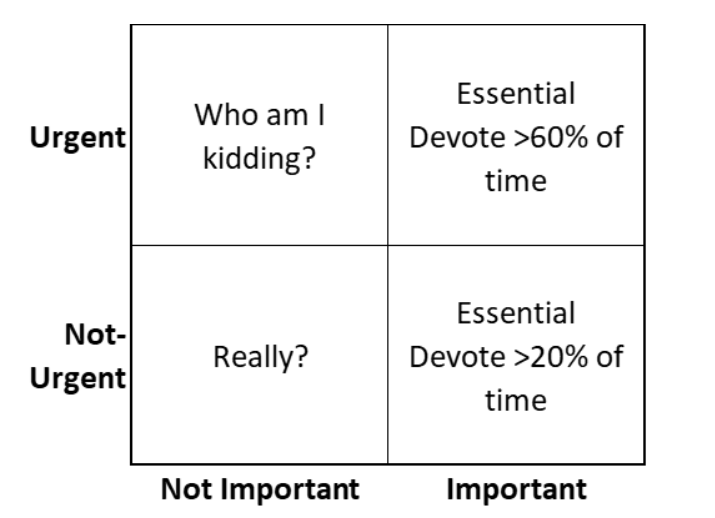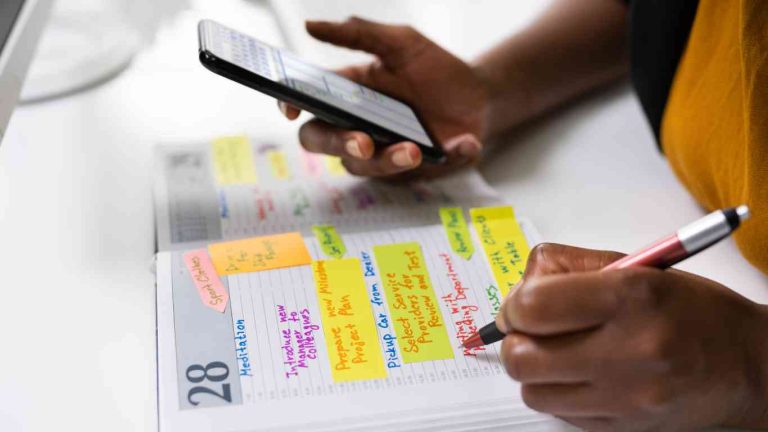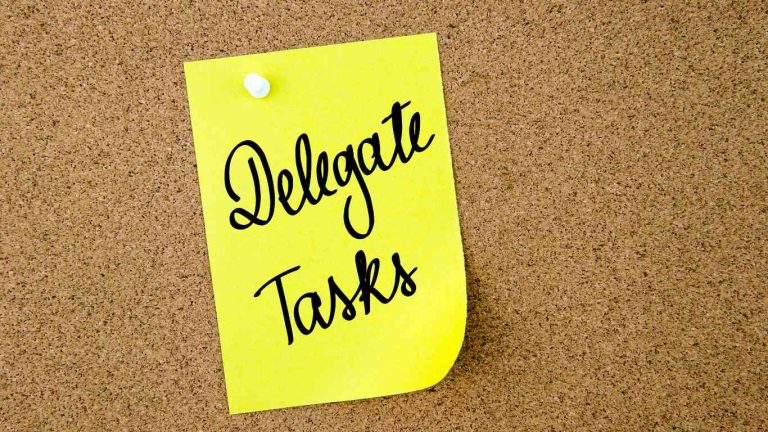Steps to avoid multitasking in your business.
As a business owner, you’re likely faced with a constant stream of tasks and responsibilities that require your attention. It can be tempting to try to tackle multiple tasks at once, but this approach can often lead to decreased productivity and quality of work. In this blog, we’ll discuss what steps you can take to avoid multitasking in your business and increase your focus and efficiency.
Prioritise your tasks
One of the key ways to avoid multitasking is to prioritise your tasks. Identify the most important and time-sensitive tasks that require your attention, and focus on completing them one at a time.
One way of doing this is to consider all tasks in terms of Urgent and Non-Urgent plus Important and Not-Important and think of using a matrix like this:

Ask yourself some tough questions about the tasks in your business and who should be doing them. As a business owner, you should be focused on the important stuff, prioritising urgent over non-urgent. Don’t forget to make sure you plan time to do the important and non-urgent tasks like strategy, planning, budgeting, and forecasting.
In terms of assessing the importance of a task consider the following:
Is the task going to contribute to the financial success of my business?
Is the task required for legal compliance?
Is the task going to contribute towards my quarter goals?
If it is not ticking any of these boxes, does it deserve your attention?
This will help you to stay focused and ensure that you’re completing the tasks that are most critical to your business.
Organisation & Planning
Plan your work, work your plan. This is best achieved by the use of a Default Diary. The default diary sets out what tasks should be done and when every week. It allows for planning all the necessary tasks associated with running your business such as marketing, sales, delivery, team management, finance, and planning time in the schedule, fitting in blocks of time for tasks that are deadline-driven and blocks of time for achieving other tasks or responsibilities.

Preparing the default diary starts you thinking about what proportion of time should be devoted to the different elements of their job.
The planning of tasks into blocks allows for more efficient working. It is never efficient for work to be picked up and put down, too much time is lost in the re-familiarisation of where you are in the process. Where did you get up to? What were you thinking came next? So the discipline of planning what you need to work on when, and then working on it when you planned to is a great self-management discipline.
Daily Planning
Having set up the weekly default diary, the act of daily planning is a huge win in avoiding multitasking. The last task of any day should be to plan tomorrow, a ten-minute job. Why? Firstly you know what is left over from today that needs to be done, follow-up calls or emails, must-do or tasks to delegate, they get listed. Secondly, the time gets allocated between these, the tasks that will be new to tomorrow that need completing, and all with an eye on the quarter’s goals and what you are normally doing that day of the week. You then have a strong plan for the following day. Thirdly, when you start your day you have a plan and hit the ground running.
Additionally, there is an enormous personal benefit of this daily planning routine – how many times when you haven’t planned tomorrow do you find yourself sitting at home in the evening thinking “I must remember to… tomorrow!” and then promptly forgetting and not remembering tomorrow. Great daily planning allows you to stop thinking about what you need to remember because it is in the plan, for tomorrow. So you can switch off and enjoy your downtime more.

Set clear goals
Before starting a task, it’s important to set clear goals for what you want to achieve. This can help you to stay focused and avoid getting sidetracked by other tasks or distractions. By setting clear goals, you can also break down larger tasks into smaller, more manageable steps, which can help to increase your productivity and reduce the temptation to multitask.
Reduce the interference, and remove the distractions
In the modern world we are a slave to modern communications, are we not? The computer has email and other social media apps on it, pop-ups in the corner of your screen. WhatsApp, Facebook, Instagram, Email, SMS, and countless others… The smartphone flashes or vibrates if it is on silent or worse still the smartwatch alerts you to it if you can’t see it. All these interruptions, going ping. What do we do? We look at them. How often are they really important? Not often. How do we ever get anything done?
Are we controlling these things or are they controlling us?
If you are in a meeting with an important customer trying to close a sale, do you answer your phone or email while you are talking to them? Most likely not as you’re not likely to get the sale, it’s rude. You focus on them.
When you are sitting at your desk trying to work through a dull but important piece of work and something pings or pops up on the screen, do you look at it? Probably yes. How often is it important? More important than what you should and need to be doing? Not often, but you have allowed yourself to become distracted.
Modern communications have made us feel like we have to be instant in our responses, but do we? If we have all of these things interrupting our flow of thought and work, how inefficient have we become? Are these interruptions important enough to warrant the disturbance to what we should be focusing on?
Most communications are not urgent in the sense that they need to be dealt with there and then, a few possibilities are and allowance can be made for this.
Outsource or delegate tasks
If you find that you’re constantly juggling too many tasks, it might be time to outsource or delegate some of them. This can help to reduce your workload and free up more time for the tasks that require your direct attention.

Look at the tasks that are not important and consider how you could give these to somebody else. Examine the cost of doing so and then compare that against the value you create for your business. Can you make more money and drive your business forward better by concentrating on the important things and delegating the not-important things?
Take regular breaks
While it might seem counterintuitive, taking breaks can help to increase your productivity and focus. Studies have shown that taking short breaks can help to recharge your brain and improve your ability to concentrate. Try to take regular breaks throughout the day, and use this time to stretch, meditate, or take a quick walk outside.
In conclusion, multitasking can be a major roadblock to productivity and focus in your business. By prioritising your tasks, organising your time to fit everything in, setting clear goals, eliminating distractions, outsourcing or delegating tasks, and taking regular breaks, you can avoid multitasking and increase your efficiency and productivity.
Remember, it’s important to stay focused on the most important tasks and avoid the temptation to switch between tasks, as this can often lead to decreased quality of work and decreased productivity.
In conclusion, attracting and retaining top talent is essential for the success of any business. By offering competitive compensation and benefits, creating a positive environment which offers growth and recognises the individual’s value to the business your attractiveness will increase to brand you as an employer of choice.
If you would like more specific guidance with understanding this or any elements on your team, why not take a look at our NoLimits Community – become a member at any level and join our community.
By Tom Allchurch

